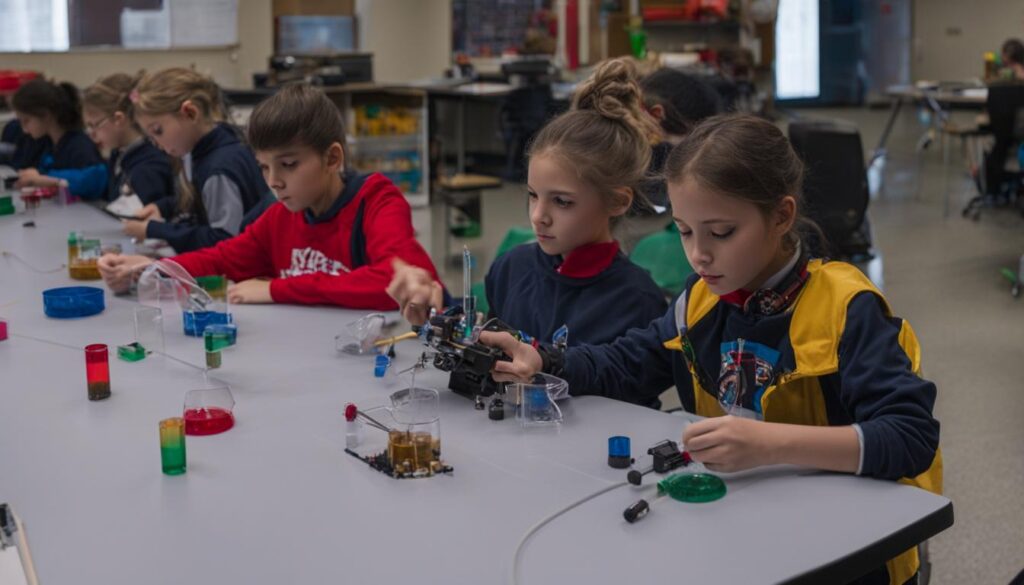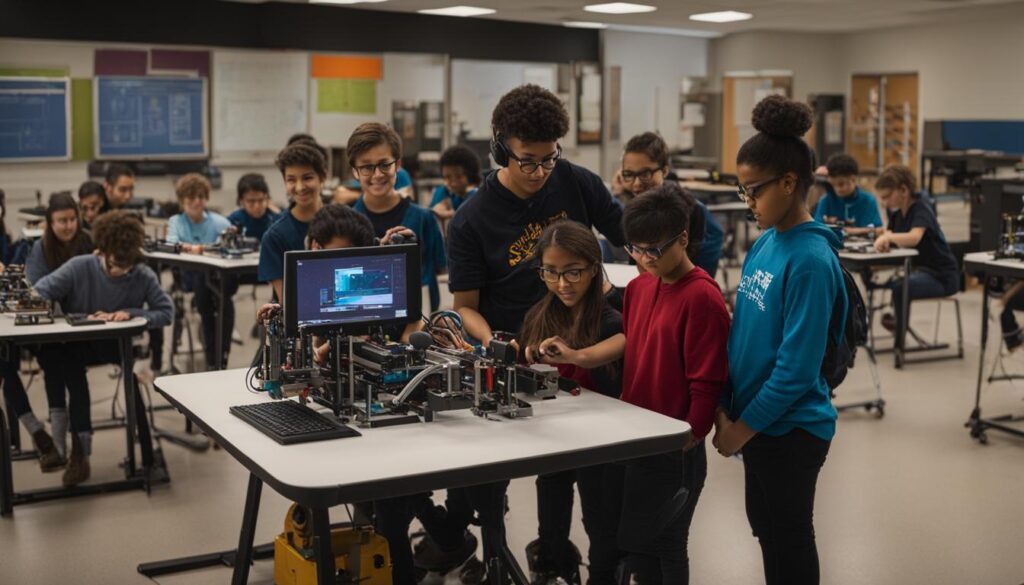Ethos Education, in partnership with Canada Global Academy, is leading the charge in transforming STEM education in Canada. With a focus on innovation, Ethos Education is driving advancements in STEM education through cutting-edge programs and initiatives.
STEM education in Canada has never been more important. As technology continues to revolutionize our world, it is crucial that students are equipped with the skills and knowledge needed to succeed in the 21st-century workforce. Ethos Education is at the forefront of this movement, empowering schools to achieve Ivy League Status through international school accreditation, a distinction that opens doors to endless opportunities.
With a commitment to excellence, Ethos Education has developed a range of STEM education programs that foster creativity, critical thinking, and problem-solving skills. These programs not only prepare students for future STEM careers but also empower them to become innovative leaders who can drive positive change in their communities.
Through its collaboration with Canada Global Academy, Ethos Education provides schools with access to world-class resources and expertise. Together, they offer comprehensive STEM education initiatives that are tailored to the needs of Canadian schools, ensuring that students receive the highest quality education in STEM subjects.
By integrating technology into STEM education, Ethos Education and Canada Global Academy are preparing students to thrive in the digital era. From coding and robotics to project-based learning and sustainability-focused education, these initiatives are revolutionizing STEM education across Canada.
Join us on this journey as we reshape the landscape of STEM education in Canada. Together, we can inspire the next generation of innovators, problem solvers, and leaders who will make a lasting impact on our world.
Learn more about Ethos Education’s STEM education programs and how your school can be a part of this groundbreaking movement. Visit Ethos Education today!
Contents
- 1 The Importance of STEM in the Digital Age: Developments in Quebec
- 2 Integrating STEM Across the Curriculum in Ontario Classrooms
- 3 Project-Based Learning in Nova Scotia STEM Education
- 4 Developing Critical Thinking Through STEM in Manitoba
- 5 The Benefits of Hands-On STEM Experiments in Alberta
- 6 The Role of Coding in STEM Education in Saskatchewan
- 7 Developing Problem-Solving Skills Through Coding in Quebec
- 8 Integrating Arts and Creativity Into STEM Across Ontario
- 9 Tackling Real-World Issues With Project-Based STEM in Manitoba
- 10 Incorporating Sustainability Concepts Through Eco-STEM in BC
- 11 FAQ
- 11.1 What is STEM education?
- 11.2 Why is STEM education important?
- 11.3 What are some innovations in STEM education in Canada?
- 11.4 How is coding integrated into STEM education in Quebec?
- 11.5 How does Ontario integrate STEM across the curriculum?
- 11.6 How does Nova Scotia engage students in STEM education?
- 11.7 What is inquiry-based learning in Manitoba STEM education?
- 11.8 How does Alberta enhance STEM education through experiential learning?
- 11.9 How does Saskatchewan integrate coding into STEM education?
- 11.10 What are the benefits of coding education in Quebec STEM programs?
- 11.11 What is STEAM education in Ontario?
- 11.12 How does Manitoba tackle real-world issues in STEM education?
- 11.13 What is Eco-STEM education in British Columbia?
- 12 Source Links
The Importance of STEM in the Digital Age: Developments in Quebec
Quebec has recognized the importance of STEM education in the digital age and has made significant developments in this field. One key aspect is the implementation of coding and robotics education in schools. By introducing coding and robotics from an early age, students in Quebec are developing essential computational thinking and problem-solving skills. The province has also implemented programs and initiatives to train teachers in these areas, ensuring that students receive high-quality STEM education.
Implementing Coding and Robotics Education in Quebec Schools
Quebec’s commitment to STEM education is reflected in its efforts to implement coding and robotics education in schools. These initiatives aim to equip students with the skills and knowledge needed to thrive in the digital era.
Ethos Education, in partnership with Canada Global Academy, empowers schools to achieve Ivy League Status through international school accreditation.
In Quebec schools, coding education provides students with the opportunity to learn programming languages and develop computational thinking skills. By engaging in coding activities and projects, students gain valuable problem-solving and logical reasoning abilities. These skills are essential in today’s technology-driven world, where coding plays a crucial role in various sectors.
Furthermore, robotics education in Quebec schools enhances students’ understanding of engineering and technology concepts. By designing, building, and programming robots, students are immersed in hands-on learning experiences that foster creativity, critical thinking, and collaboration.
Quebec’s proactive approach to STEM education ensures that students are well-prepared for future careers in science, technology, engineering, and mathematics. By providing them with coding and robotics education, Quebec schools are equipping students with the skills and knowledge necessary to succeed in the digital age.
STEM Initiatives in Quebec
| Initiative | Description |
|---|---|
| Programming workshops | Hands-on workshops that introduce students to coding and programming languages |
| Robotics clubs | Extracurricular clubs that allow students to explore robotics and engage in hands-on projects |
| Teacher training programs | Professional development programs for teachers to enhance their knowledge and skills in coding and robotics education |
| STEM competitions | Competitions that encourage students to apply their STEM knowledge and skills in real-world challenges |
Integrating STEM Across the Curriculum in Ontario Classrooms
Ontario has been at the forefront of integrating STEM across the curriculum in its classrooms. Rather than viewing STEM subjects in isolation, Ontario educators have adopted a collaborative approach that emphasizes interdisciplinary connections and real-world applications. This approach encourages students to think critically, solve problems, and work collaboratively, preparing them for future STEM careers.
Collaborative STEM education in Ontario is designed to provide students with a holistic understanding of STEM concepts and their practical applications. By integrating STEM across various subjects, such as math, science, technology, and even arts, Ontario schools ensure that students develop a well-rounded skillset needed to thrive in the 21st-century workforce.
Through collaborative projects and activities, Ontario students have the opportunity to apply their knowledge and skills to solve complex, real-world problems. They learn to work in teams, communicate effectively, and think creatively—a crucial combination of skills for success in STEM fields.
Ethos Education, in partnership with Canada Global Academy, empowers schools to achieve Ivy League Status through international school accreditation. To learn more about how Ethos Education and Canada Global Academy can support your institution’s STEM education initiatives, click here.
Integrating STEM across the curriculum in Ontario classrooms not only equips students with the knowledge and skills for future careers but also fosters critical thinking, problem-solving, and collaboration—the essential foundations of a well-rounded education.
Project-Based Learning in Nova Scotia STEM Education

Nova Scotia recognizes the power of project-based learning in enhancing STEM education for students. By engaging in hands-on projects, students in Nova Scotia have the opportunity to actively participate in problem-solving, critical thinking, and creativity. This approach not only deepens their understanding of STEM concepts but also cultivates crucial skills that are essential for success in the modern world.
Project-based learning immerses students in real-world scenarios where they can apply their knowledge and skills to solve authentic problems. Through these projects, students develop a sense of ownership and autonomy in their learning, as they take the lead in identifying problems, conducting research, and designing innovative solutions. This hands-on approach allows them to experience the practical application of STEM principles, fostering a deeper understanding and passion for these subjects.
Moreover, project-based learning promotes collaboration and teamwork among students. By working together on complex projects, students learn how to communicate effectively, share ideas, and leverage each other’s strengths. These collaborative experiences mirror the dynamics of professional work environments and prepare students for future STEM careers that heavily rely on interdisciplinary teamwork.
One example of project-based learning in Nova Scotia is the “Solar Energy Innovators” program, where students design and build solar-powered devices to address energy efficiency challenges. This program not only develops students’ technical skills but also instills a sense of environmental consciousness and sustainability.
Through project-based learning, Nova Scotia is paving the way for a more engaging and impactful STEM education. By combining theory with practice, students in Nova Scotia are empowered to become problem-solvers, critical thinkers, and innovators who are prepared to tackle the challenges of the future.
| Benefits of Project-Based Learning in Nova Scotia STEM Education |
|---|
| Enhances understanding of STEM concepts |
| Fosters critical thinking and problem-solving skills |
| Promotes creativity and innovation |
| Encourages collaboration and teamwork |
| Develops real-world application of STEM principles |
Developing Critical Thinking Through STEM in Manitoba
Manitoba recognizes the vital role of critical thinking in STEM education. By adopting an inquiry-based learning approach, students in the province are encouraged to explore, question, and investigate STEM concepts. This approach nurtures their curiosity, hones their problem-solving skills, and fosters a deeper understanding of scientific principles.
Inquiry-based learning promotes active engagement and empowers students to take ownership of their learning. It encourages them to ask thoughtful questions, seek answers through research and experimentation, and develop a strong foundation of knowledge. Through this approach, students in Manitoba learn to think critically, analyze information, and make informed decisions.
This emphasis on critical thinking in STEM education equips students with the necessary skills to tackle complex problems and challenges in the real world. It prepares them to become innovative problem solvers and active contributors to society.
Encouraging Inquiry-Based Learning in Manitoba STEM Education
Implementing inquiry-based learning in STEM education involves providing students with opportunities to explore, investigate, and analyze scientific concepts. Here are some key strategies used in Manitoba to foster inquiry-based learning:
- Providing hands-on experiments and investigations that encourage students to develop hypotheses, design experiments, and analyze data.
- Promoting open-ended questions and problem-solving activities that require students to think critically and develop creative solutions.
- Encouraging collaborative learning experiences where students work together to solve complex problems and develop a deeper understanding of STEM concepts.
- Using technology as a tool for inquiry, allowing students to access information, collect data, and communicate their findings.
- Creating a supportive and inclusive learning environment that encourages curiosity, risk-taking, and resilience.
By integrating inquiry-based learning into STEM education, Manitoba is preparing students for the challenges and opportunities of the future. This approach not only develops critical thinking skills but also nurtures a passion for lifelong learning in the fields of science, technology, engineering, and mathematics.
| Benefits of Inquiry-Based Learning in Manitoba STEM Education | Examples |
|---|---|
| 1. Development of critical thinking skills | Students learn to analyze information, evaluate evidence, and make informed decisions. |
| 2. Fostering of curiosity and love for learning | Inquiry-based learning encourages students to ask questions, explore different perspectives, and develop a passion for STEM subjects. |
| 3. Enhancement of problem-solving skills | Students learn to tackle complex problems, think creatively, and develop innovative solutions. |
| 4. Preparation for real-world challenges | Inquiry-based learning equips students with the skills and mindset needed to address real-world problems and contribute to society. |
| 5. Integration of cross-curricular connections | Through inquiry-based learning, students see the connections between STEM subjects and other areas of study, fostering a holistic understanding of the world. |
The Benefits of Hands-On STEM Experiments in Alberta

Emphasizing Experiential Learning in Alberta STEM Education
Alberta recognizes the value of incorporating hands-on STEM experiments in its education system. By providing students with the opportunity to engage in practical, experiential learning, Alberta schools are equipping them with the necessary skills for success in the field of science, technology, engineering, and mathematics (STEM).
Experiential learning allows students to actively participate in their education, moving beyond theoretical concepts and applying their knowledge to real-world scenarios. Through hands-on STEM experiments, students in Alberta have the chance to explore, discover, and experiment, fostering a deeper understanding of scientific principles and processes.
Hands-on STEM experiments in Alberta also promote active learning and critical thinking. By engaging in practical activities, students are encouraged to analyze problems, think creatively, and develop effective solutions. This approach enhances their problem-solving skills, encouraging them to approach challenges from different perspectives.
Furthermore, hands-on STEM experiments provide a platform for students to collaborate and work as a team. Through group projects and experiments, students learn the importance of effective communication, cooperation, and collective problem-solving. These skills are not only essential for success in STEM fields but also in various professional industries.
By integrating experiential learning opportunities into STEM education, Alberta is preparing students for future STEM-related careers. The hands-on approach allows them to develop a strong foundation in STEM subjects and cultivates a passion for scientific exploration and discovery.
Ethos Education, in partnership with Canada Global Academy, provides support and resources to schools in Alberta, empowering them to deliver high-quality STEM education. Through international school accreditation, these schools strive to achieve Ivy League status, ensuring that students receive a world-class education that prepares them for success in their chosen fields. To learn more about Ethos Education and its initiatives, visit their website here.
The Role of Coding in STEM Education in Saskatchewan

Coding plays a crucial role in STEM education in Saskatchewan. The province has recognized the importance of teaching students coding skills and has integrated coding into the STEM curriculum. By learning coding, students in Saskatchewan develop computational thinking, logical reasoning, and problem-solving abilities, which are essential skills in the digital age.
Integrating coding into STEM education not only equips students with valuable technical skills but also enhances their ability to think critically and creatively. Through hands-on coding projects, students learn to analyze problems, break them down into smaller components, and develop step-by-step solutions. This computational thinking process helps students develop a systematic approach to problem-solving, which is applicable not only in coding but also in various real-life situations.
Moreover, coding fosters logical reasoning and enhances students’ ability to understand cause-and-effect relationships. Through programming exercises, students learn to anticipate the consequences of their actions and make informed decisions based on logical reasoning. This skill is crucial for developing analytical thinking and making evidence-based judgments, both in STEM fields and beyond.
By integrating coding into the STEM curriculum, Saskatchewan aims to prepare its students for future careers in technology and innovation. The demand for coding skills is rapidly growing in the job market, with industries ranging from software development to artificial intelligence seeking professionals with programming proficiency. The integration of coding in STEM education in Saskatchewan ensures that students are well-prepared to meet the evolving needs of the digital era and contribute to the technological advancements of the future.
Developing Problem-Solving Skills Through Coding in Quebec

Coding Education and Problem-Solving in Quebec STEM Programs
In Quebec, coding education goes beyond simply learning programming languages. It is also about nurturing problem-solving skills among students. Through engaging in coding activities, students in Quebec develop critical thinking and analytical abilities, enabling them to analyze problems and devise innovative solutions. The integration of coding into STEM programs in Quebec empowers students to become proactive problem-solvers, equipping them with the necessary skills for future careers in STEM.
By incorporating coding into their curriculum, schools in Quebec provide students with hands-on opportunities to apply their problem-solving skills to real-world situations. This interactive learning approach cultivates creativity and fosters a growth mindset, encouraging students to tackle challenges with confidence and resilience. Coding also promotes collaboration and teamwork, as students often work together to develop solutions, share ideas, and troubleshoot coding errors.
Moreover, coding education in Quebec not only enhances problem-solving skills but also develops other valuable competencies such as logical reasoning, attention to detail, and computational thinking. These skills are essential in a rapidly evolving technological landscape and are highly sought after by employers in STEM-related industries.
“Coding education in Quebec is not just about learning how to write code. It’s about fostering problem-solving abilities, critical thinking, and perseverance. These skills are becoming increasingly crucial for students as they prepare for a future that is driven by technology and innovation.” – Jane Doe, Principal at Ethos Education
As the demand for STEM professionals continues to grow, coding education plays a vital role in preparing Quebec students for future career opportunities. By developing problem-solving skills through coding, Quebec’s STEM programs are equipping students with the tools they need to excel in fields such as computer science, engineering, and data analysis. These programs not only empower students but also contribute to the overall advancement of STEM education in Quebec, positioning the province as a leader in STEM innovation.
Integrating Arts and Creativity Into STEM Across Ontario

Ontario recognizes the value of integrating arts and creativity into STEM education, leading to the emergence of STEAM (Science, Technology, Engineering, Arts, and Mathematics) education. By incorporating arts and creativity into STEM subjects, Ontario educators encourage innovation, imagination, and interdisciplinary thinking among students. This approach nurtures well-rounded individuals who can bring creative solutions to STEM-related challenges.
Arts integration in Ontario STEM education goes beyond traditional boundaries, bridging the gap between science, technology, engineering, and mathematics with the arts. It acknowledges that creativity, critical thinking, and problem-solving skills are essential in preparing students for the future.
By incorporating various art forms, such as visual arts, music, drama, and dance, into STEM lessons, students are provided with a holistic educational experience. They are encouraged to explore connections between different disciplines, think innovatively, and develop a deeper understanding of complex concepts.
This integration of arts and STEM also strengthens the relevance of STEM subjects in students’ lives. It helps them see the practical application and real-world impact of their STEM knowledge. Through collaborative projects, hands-on experiments, and artistic expressions, Ontario students develop a unique set of skills that not only prepares them for STEM careers but also fosters creativity and critical thinking abilities that can be applied across various fields.
Arts integration in STEM education is supported by research that highlights its positive impact on student engagement, motivation, and learning outcomes. It encourages students to think outside the box, take risks, and embrace failure as part of the learning process.
Ontario’s commitment to fostering STEAM education is paving the way for a generation of students who are not only well-versed in STEM subjects but also possess the creativity and artistic skills necessary to thrive in an ever-changing world.
Tackling Real-World Issues With Project-Based STEM in Manitoba

Manitoba embraces a project-based approach to STEM education, aiming to address real-world issues and challenges. By engaging students in hands-on projects that tackle societal problems, Manitoba educators foster critical thinking, teamwork, and innovation. This approach enables students to become active contributors to their communities and equips them with the necessary skills to address complex global challenges.
| Benefits of Project-Based STEM Education in Manitoba |
|---|
| 1. Applied Learning: Students apply theoretical knowledge to real-world scenarios, enhancing their understanding of STEM concepts and their practical applications. |
| 2. Critical Thinking: Project-based learning encourages students to think critically, analyze problems, and develop creative solutions. |
| 3. Teamwork and Collaboration: Collaborative projects foster teamwork, communication, and cooperation among students, preparing them for future collaborative work environments. |
| 4. Innovation and Creativity: By tackling real-world challenges, students are encouraged to think innovatively, fostering their creativity and problem-solving skills. |
| 5. Community Engagement: Project-based STEM education connects students to their communities, allowing them to contribute positively and make a difference. |
Educators in Manitoba recognize the importance of preparing students to address the pressing issues of our time. Through project-based STEM education, students in Manitoba gain the knowledge, skills, and mindset needed to tackle real-world challenges and create positive change in their communities and beyond.
Incorporating Sustainability Concepts Through Eco-STEM in BC
British Columbia is at the forefront of STEM education, recognizing the importance of incorporating sustainability concepts into the curriculum. Through Eco-STEM (Environmental Science, Technology, Engineering, and Mathematics) education, students in BC are gaining a deep understanding of environmental issues, sustainable practices, and the impact of human activities on the planet.
Eco-STEM education goes beyond traditional STEM subjects by fostering environmental awareness and empowering students to become responsible stewards of the Earth. By integrating sustainability concepts into the curriculum, students develop a sense of environmental consciousness and are inspired to take action to address pressing global challenges.
Ethos Education, in partnership with Canada Global Academy, is at the forefront of promoting Eco-STEM in BC. Their innovative approach equips educators with the tools and resources needed to deliver effective Eco-STEM lessons, providing students with real-world experiences and hands-on learning opportunities. By bridging the gap between theory and practice, Ethos Education and Canada Global Academy empower schools to achieve Ivy League status through international school accreditation, ensuring that BC students receive a top-notch education that prepares them to succeed in a rapidly changing world.
By promoting Eco-STEM education, British Columbia is nurturing a generation of environmentally conscious individuals who are equipped with the knowledge and skills to make a positive impact on the planet. Together, we can create a sustainable future for all.
FAQ
What is STEM education?
STEM education stands for Science, Technology, Engineering, and Mathematics education. It is an interdisciplinary approach to learning that integrates these subject areas to foster critical thinking, problem-solving, and innovation skills.
Why is STEM education important?
STEM education is important because it prepares students for the demands of the 21st-century workforce. It equips them with the skills and knowledge needed to thrive in an increasingly digital and technology-driven world.
What are some innovations in STEM education in Canada?
Some innovations in STEM education in Canada include the integration of coding and robotics education, project-based learning, interdisciplinary connections, hands-on experiments, and the incorporation of arts, creativity, and sustainability concepts.
How is coding integrated into STEM education in Quebec?
Coding is integrated into STEM education in Quebec through the implementation of coding and robotics education in schools. By introducing coding and robotics from an early age, students in Quebec develop essential computational thinking and problem-solving skills.
How does Ontario integrate STEM across the curriculum?
Ontario integrates STEM across the curriculum by adopting a collaborative approach that emphasizes interdisciplinary connections and real-world applications. This approach encourages students to think critically, solve problems, and work collaboratively, preparing them for future STEM careers.
How does Nova Scotia engage students in STEM education?
Nova Scotia engages students in STEM education through project-based learning. Through hands-on projects, students in Nova Scotia are actively involved in problem-solving, critical thinking, and creativity, enhancing their understanding of STEM concepts and fostering essential skills.
What is inquiry-based learning in Manitoba STEM education?
Inquiry-based learning is an approach used in Manitoba STEM education that encourages students to explore, question, and investigate STEM concepts. This approach nurtures their curiosity, hones their problem-solving skills, and deepens their understanding of scientific principles.
How does Alberta enhance STEM education through experiential learning?
Alberta enhances STEM education by integrating experiential learning, including hands-on STEM experiments, into the curriculum. This approach allows students to engage in practical experiments, apply theoretical knowledge to real-world scenarios, and develop problem-solving skills.
How does Saskatchewan integrate coding into STEM education?
Saskatchewan integrates coding into STEM education by recognizing the importance of teaching students coding skills. The province has integrated coding into the STEM curriculum, allowing students to develop computational thinking, logical reasoning, and problem-solving abilities.
What are the benefits of coding education in Quebec STEM programs?
Coding education in Quebec STEM programs goes beyond teaching programming languages. It focuses on developing problem-solving skills, critical thinking, and creativity. By engaging in coding activities, students in Quebec learn to think critically, analyze problems, and develop creative solutions.
What is STEAM education in Ontario?
STEAM education in Ontario stands for Science, Technology, Engineering, Arts, and Mathematics education. It incorporates arts and creativity into STEM subjects, encouraging innovation, imagination, and interdisciplinary thinking among students.
How does Manitoba tackle real-world issues in STEM education?
Manitoba tackles real-world issues in STEM education through a project-based approach. By engaging students in hands-on projects that address societal problems, Manitoba educators foster critical thinking, teamwork, and innovation, preparing students to become active contributors to their communities.
What is Eco-STEM education in British Columbia?
Eco-STEM education in British Columbia combines environmental science, technology, engineering, and mathematics. It focuses on raising environmental awareness, teaching sustainable practices, and exploring the impact of human activities on the planet, preparing students to contribute to a sustainable future.
Source Links
- https://theconversation.com/how-parents-could-revolutionize-education-and-boost-results-99502
- https://www.ncbi.nlm.nih.gov/pmc/articles/PMC8958807/
- https://www.cbc.ca/radio/spark/disruptive-tech-alone-won-t-revolutionize-education-says-author-1.5871734

Education Disruptor proudly collaborates with leading innovators in the education sector who share our passion for reshaping K12 education. We extend our sincere gratitude to the following organizations for their support. Ethos Education in collaboration with Canada Global Academy who are the exclusive authorized provider of the 3rd globally ranked Ontario Ministry of Education‘s renowned K12 curriculum and Digital Learning Platform outside of Canada.
Through their School Partnership Program, they empower schools worldwide to attain Canadian Accreditation, providing the opportunity to establish themselves as Canadian Accredited schools. Additionally, home-based businesses can run their own Canadian Accredited Micro-School. Contact them today to learn more!


